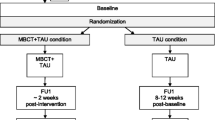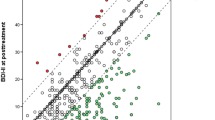Abstract
Major depressive disorder (MDD) is the leading cause of disability in the developed world, yet broadly effective treatments remain elusive. The primary aim of this pilot study was to investigate the efficacy of mindfulness-based cognitive therapy (MBCT) monotherapy, compared to sertraline monotherapy, for patients with acute MDD. This open-label, nonrandomized controlled trial examined a MBCT cohort (N = 23) recruited to match the gender, age, and depression severity of a depressed control group (N = 20) that completed 8 weeks of monotherapy with the antidepressant sertraline. The 17-item clinician-rated Hamilton Depression Severity Rating Scale (HAMD-17) was the primary outcome measure of depression to assess overall change after 8 weeks and rates of response and remission. The 16-item Quick Inventory of Depressive Symptomatology-Self Report (QIDS-SR16) was the secondary outcome measure to further assess depression severity. Both cohorts were demographically similar and showed significant improvement in depression ratings. No difference was found in the degree of change in HAMD-17 scores (t(34) = 1.42, p = 0.165) between groups. Secondary analysis showed statistically significant differences in mean scores of the QIDS-SR16 (t(32) = 4.39, p < 0.0001), with the MBCT group showing greater mean improvement. This study was limited by the small sample size and non-randomized, non-blinded design. Preliminary findings suggest that an 8-week course of MBCT monotherapy may be effective in treating MDD and is a viable alternative to antidepressant medication. Greater changes in the self-rated QIDS-SR16 for the MBCT cohort raise the possibility that patients derive additional subjective benefit from enhanced self-efficacy skills.
Similar content being viewed by others
References
Arch, J. J., & Craske, M. G. (2006). Mechanisms of mindfulness: emotion regulation following a focused breathing induction. Behaviour Research and Therapy, 44(12), 1849–1858. doi:10.1016/j.brat.2005.12.007.
Avery, D., & Silverman, J. (1984). Psychomotor retardation and agitation in depression. Relationship to age, sex, and response to treatment. Journal of Affective Disorders, 7(1), 67–76.
Baer, R. A., Smith, G. T., Hopkins, J., Krietemeyer, J., & Toney, L. (2006). Using self-report assessment methods to explore facets of mindfulness. Assessment, 13(1), 27–45. doi:10.1177/1073191105283504.
Barnes, P. M., et al. (2004). Complementary and alternative medicine use among adults: United States. Advance Data, 343, 1–19.
Barnhofer, T., Crane, C., Hargus, E., Amarasinghe, M., Winder, R., & Williams, J. M. (2009). Mindfulness-based cognitive therapy as a treatment for chronic depression: a preliminary study. Behaviour Research and Therapy, 47(5), 366–373. doi:10.1016/j.brat.2009.01.019.
Chiesa, A., Mandelli, L., & Serretti, A. (2012). Mindfulness-based cognitive therapy versus psycho-education for patients with major depression who did not achieve remission following antidepressant treatment: a preliminary analysis. Journal of Alternative and Complementary Medicine, 18(8), 756–760. doi:10.1089/acm.2011.0407.
Cuijpers, P., Reynolds, C. F., 3rd, Donker, T., Li, J., Andersson, G., & Beekman, A. (2012). Personalized treatment of adult depression: medication, psychotherapy, or both? A systematic review. Depression and Anxiety, 29(10), 855–864. doi:10.1002/da.21985.
Dunlop, B. W., Thase, M. E., Wun, C. C., Fayyad, R., Guico-Pabia, C. J., Musgnung, J., et al. (2012). A meta-analysis of factors impacting detection of antidepressant efficacy in clinical trials: the importance of academic sites. Neuropsychopharmacology, 37(13), 2830–2836. doi:10.1038/npp.2012.153 npp2012153.
Eisendrath, S. J., Delucchi, K., Bitner, R., Fenimore, P., Smit, M., & McLane, M. (2008). Mindfulness-based cognitive therapy for treatment-resistant depression: a pilot study. Psychotherapy and Psychosomatics, 77(5), 319–320. doi:10.1159/000142525.
Eisendrath, S., Chartier, M., & McLane, M. (2011). Adapting mindfulness-based cognitive therapy for treatment-resistant depression: a clinical case study. Cognitive Behavior Practice, 18(3), 362–370. doi:10.1016/j.cbpra.2010.05.004.
Finucane, A., & Mercer, S. W. (2006). An exploratory mixed methods study of the acceptability and effectiveness of mindfulness-based cognitive therapy for patients with active depression and anxiety in primary care. BMC Psychiatry, 6, 14. doi:10.1186/1471-244X-6-14.
First, M. B., Spitzer, Robert L, Gibbon Miriam, and Williams, Janet B.W. (2002). Structured clinical interview for DSM-IV-TR Axis I disorders, research version, Patient Edition. (SCID-I/P). Biometrics Research, New York State Psychiatric Institute, November
Folstein, M. F., Folstein, S. E., & McHugh, P. R. (1975). Mini-mental state. A practical method for grading the cognitive state of patients for the clinician. Journal of Psychiatric Research, 12(3), 189–198.
Fresco, D. M., Moore, M. T., van Dulmen, M. H., Segal, Z. V., Ma, S. H., Teasdale, J. D., et al. (2007). Initial psychometric properties of the experiences questionnaire: validation of a self-report measure of decentering. Behaviour Therapy, 38(3), 234–246. doi:10.1016/j.beth.2006.08.003.
Glue, P., Donovan, M. R., Kolluri, S., & Emir, B. (2010). Meta-analysis of relapse prevention antidepressant trials in depressive disorders. The Australian and New Zealand Journal of Psychiatry, 44(8), 697–705. doi:10.3109/00048671003705441.
Godfrin, K. A., & van Heeringen, C. (2010). The effects of mindfulness-based cognitive therapy on recurrence of depressive episodes, mental health and quality of life: a randomized controlled study. Behaviour Research and Therapy, 48(8), 738–746. doi:10.1016/j.brat.2010.04.006.
Hamidian, S., Omidi, A., Mousavinasab, S. M., & Naziri, G. (2013). Comparison of the effect of mindfulness-based cognitive therapy accompanied by pharmacotherapy with pharmacotherapy alone in treating dysthymic patients. Iran Red Crescent Medical Journal, 15(3), 239–244. doi:10.5812/ircmj.8024.
Hamilton, M. (1967). Development of a rating scale for primary depressive illness. British Journal of Social & Clinical Psychology, 6(4), 278–296.
Kenny, M. A., & Williams, J. M. (2007). Treatment-resistant depressed patients show a good response to mindfulness-based cognitive therapy. Behaviour Research and Therapy, 45(3), 617–625. doi:10.1016/j.brat.2006.04.008.
Kingston, J., Chadwick, P., Meron, D., & Skinner, T. C. (2007). A pilot randomized control trial investigating the effect of mindfulness practice on pain tolerance, psychological well-being, and physiological activity. Journal of Psychosomatic Research, 62(3), 297–300. doi:10.1016/j.jpsychores.2006.10.007.
Koolschijn, P. C., van Haren, N. E., Lensvelt-Mulders, G. J., Hulshoff Pol, H. E., & Kahn, R. S. (2009). Brain volume abnormalities in major depressive disorder: a meta-analysis of magnetic resonance imaging studies. Human Brain Mapping, 30(11), 3719–3735. doi:10.1002/hbm.20801.
Kuyken, W., Byford, S., Taylor, R. S., Watkins, E., Holden, E., White, K., et al. (2008). Mindfulness-based cognitive therapy to prevent relapse in recurrent depression. Journal of Consulting and Clinical Psychology, 76(6), 966–978.
Kuyken, W., Byford, S., Byng, R., Dalgleish, T., Lewis, G., Taylor, R., et al. (2010a). Study protocol for a randomized controlled trial comparing mindfulness-based cognitive therapy with maintenance anti-depressant treatment in the prevention of depressive relapse/recurrence: the PREVENT trial. Trials, 11, 99. doi:10.1186/1745-6215-11-99.
Kuyken, W., Watkins, E., Holden, E., White, K., Taylor, R. S., Byford, S., et al. (2010b). How does mindfulness-based cognitive therapy work? Behaviour Research and Therapy, 48(11), 1105–1112. doi:10.1016/j.brat.2010.08.003.
Ma, S. H., & Teasdale, J. D. (2004). Mindfulness-based cognitive therapy for depression: replication and exploration of differential relapse prevention effects. Journal of Consulting and Clinical Psychology, 72(1), 31–40.
MacKinnon, D. P. (2008). Introduction to statistical mediation analysis. Ney York: Taylor & Francis Group.
Manicavasgar, V., Parker, G., & Perich, T. (2011). Mindfulness-based cognitive therapy vs cognitive behaviour therapy as a treatment for non-melancholic depression. Journal of Affective Disorders, 130(1–2), 138–144. doi:10.1016/j.jad.2010.09.027.
Mauri, M. C., Laini, V., Cerveri, G., Scalvini, M. E., Volonteri, L. S., Regispani, F., et al. (2002). Clinical outcome and tolerability of sertraline in major depression: a study with plasma levels. Progress in Neuro-Psychopharmacology & Biological Psychiatry, 26(3), 597–601.
Murray, C. J., & Lopez, A. D. (1996). Evidence-based health policy–lessons from the global burden of disease study. Science, 274(5288), 740–743.
Neff, K. D. (2009). The role of self-compassion in development: a healthier way to relate to oneself. Human Development, 52(4), 211–214.
Nolen-Hoeksema, S., & Morrow, J. (1991). A prospective study of depression and posttraumatic stress symptoms after a natural disaster: the 1989 Loma Prieta Earthquake. Journal of Personal and Social Psychology, 61(1), 115–121.
Nolen-Hoeksema, S., Morrow, J., & Fredrickson, B. L. (1993). Response styles and the duration of episodes of depressed mood. Journal of Abnormal Psychology, 102(1), 20–28.
Omidi, A., Mohammadkhani, P., Mohammadi, A., & Zargar, F. (2013). Comparing mindfulness based cognitive therapy and traditional cognitive behavior therapy with treatments as usual on reduction of major depressive disorder symptoms. Iran Red Crescent Medical Journal, 15(2), 142–146. doi:10.5812/ircmj.8018.
Rawdin, B. S., Mellon, S. H., Dhabhar, F. S., Epel, E. S., Puterman, E., Su, Y., et al. (2012). Dysregulated relationship of inflammation and oxidative stress in major depression. Brain, Behavior, and Immunity. doi:10.1016/j.bbi.2012.11.011.
Rush, A. J., Trivedi, M. H., Ibrahim, H. M., Carmody, T. J., Arnow, B., Klein, D. N., et al. (2003). The 16-Item Quick Inventory of Depressive Symptomatology (QIDS), clinician rating (QIDS-C), and self-report (QIDS-SR): a psychometric evaluation in patients with chronic major depression. Biological Psychiatry, 54(5), 573–583.
Rush, A. J., Trivedi, M. H., Wisniewski, S. R., Stewart, J. W., Nierenberg, A. A., Thase, M. E., et al. (2006). Bupropion-SR, sertraline, or venlafaxine-XR after failure of SSRIs for depression. New England Journal of Medicine, 354(12), 1231–1242. doi:10.1056/NEJMoa052963.
Segal, Z., Williams, J. M., & Teasdale, J. (2002). Mindfulness -based cognitive therapy for depression. New York: The Guilford press.
Segal, Z. V., Bieling, P., Young, T., MacQueen, G., Cooke, R., Martin, L., et al. (2010). Antidepressant monotherapy vs sequential pharmacotherapy and mindfulness-based cognitive therapy, or placebo, for relapse prophylaxis in recurrent depression. Archives of General Psychiatry, 67(12), 1256–1264. doi:10.1001/archgenpsychiatry.2010.168.
Shawyer, F., Meadows, G. N., Judd, F., Martin, P. R., Segal, Z., & Piterman, L. (2012). The DARE study of relapse prevention in depression: design for a phase 1/2 translational randomised controlled trial involving mindfulness-based cognitive therapy and supported self monitoring. BMC Psychiatry, 12, 3. doi:10.1186/1471-244X-12-3.
Teasdale, J. D., Segal, Z. V., Williams, J. M., Ridgeway, V. A., Soulsby, J. M., & Lau, M. A. (2000). Prevention of relapse/recurrence in major depression by mindfulness-based cognitive therapy. Journal of Consulting and Clinical Psychology, 68(4), 615–623.
Thase, M. E., Haight, B. R., Richard, N., Rockett, C. B., Mitton, M., Modell, J. G., et al. (2005). Remission rates following antidepressant therapy with bupropion or selective serotonin reuptake inhibitors: a meta-analysis of original data from 7 randomized controlled trials. Journal of Clinical Psychiatry, 66(8), 974–981.
Van Dam, N. T., Sheppard, S. C., Forsyth, J. P., & Earleywine, M. (2010). Self-compassion is a better predictor than mindfulness of symptom severity and quality of life in mixed anxiety and depression. Journal of Anxiety Disorders. doi:10.1016/j.janxdis.2010.08.011.
WHO (2001) Burden of mental and behavioral disorders. Geneva: WHO.
Author information
Authors and Affiliations
Corresponding author
Rights and permissions
About this article
Cite this article
Eisendrath, S.J., Gillung, E., Delucchi, K. et al. A Preliminary Study: Efficacy of Mindfulness-Based Cognitive Therapy versus Sertraline as First-line Treatments for Major Depressive Disorder. Mindfulness 6, 475–482 (2015). https://doi.org/10.1007/s12671-014-0280-8
Published:
Issue Date:
DOI: https://doi.org/10.1007/s12671-014-0280-8




